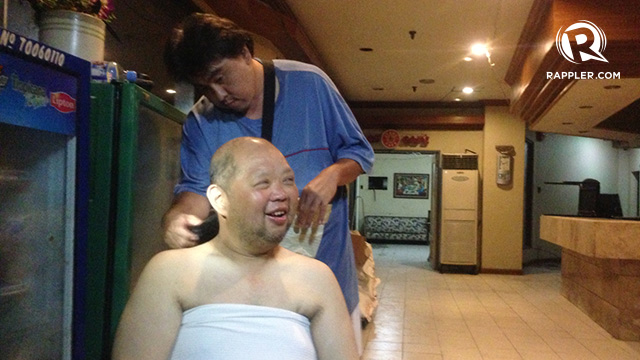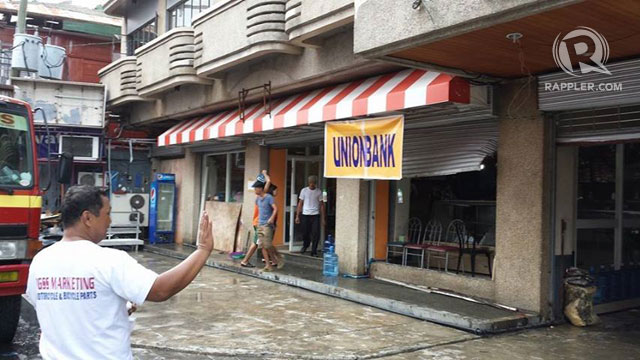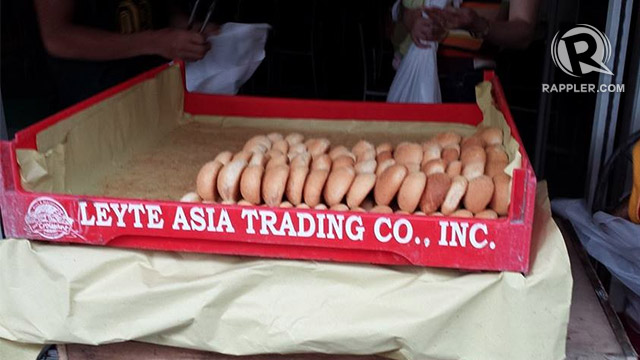SUMMARY
This is AI generated summarization, which may have errors. For context, always refer to the full article.

This was what President Benigno Aquino III supposedly told local businessman Kenneth Uy in a tense briefing where he reportedly walked out after another businessman, Jeff Manibay, recommended the imposition of martial law in typhoon-affected areas.
It was November 10, just two days after Typhoon Yolanda (Haiyan) devastated Tacloban City and the rest of Leyte province, and relief had not reached the surviving residents. Local officials and businesmen discussed their urgent needs with Aquino, recalling one instance when Uy was fired at by looters in downtown Tacloban.
Uy vividly remembered the day Yolanda battered his city. “The day after the typhoon, I didn’t want to wake up, I didn’t want to stand up, because when I looked out of the window, I saw that it was true – that we’ve been really hit by a typhoon, that it is really going to change our life,” Uy said.
Uy has recovered since then. By the time the President returned to the province on Monday, November 18, Uy was back in business. He has shaved his head to show that he has moved on and is ready to embark on a new beginning.
Businessman’s nightmare
Yolanda has become every businessman’s nightmare, even worse than bankruptcy, Uy told Rappler in a conversation in front of his hotel along Zamora Street.
It is now one of the safest streets in Tacloban City. Uy’s hotel, the Asia Stars Hotel, served as the nerve center of the augmentation team sent by the Philippine National Police (PNP) to help restore peace and security in the city. Police generals, media, and international aid groups are staying there. A room costs about P2,500 a night.
Across the street from the hotel were remnants of panic and disorder: destroyed stores and restaurants. Broken bottles of medicines littered the front of a pharmacy.
A few blocks away, the grocery that Uy’s family owned – one of the oldest in the city – was ransacked. It survived cutthroat competition from Gaisano and Robinsons malls but not the hunger and desperation of the typhoon victims.

‘Crazy’ businessman
“You have to be a little bit crazy if you want to start a business now. I think I’m crazy enough, and I think I can find a few more crazy people around to join me,” he said.
He did. On Sunday, November 17, he started selling prepaid call cards that came from Cebu. On Wednesday, November 20, he will open a tiangge (flea market) with some local traders he invited.
The store will sell food, water, toiletries, fuel, and gas – scarce commodities that are badly needed in the affected areas.
Water is locally sourced. Canned goods, toiletries, and fuel will come from Cebu. Suppliers from Samar will bring in vegetables beginning Friday, November 22.
UnionBank and Banco de Oro will also have desks at the store to receive deposits and service withdrawals.
The two banks, together with government-owned Land Bank of the Philippines and the Development Bank of the Philippines, will open ahead of other banks, which will reportedly resume operations on Friday yet.
“We have to put the infrastructure for people to buy so that those who can afford will not line up for the relief goods. The people who really need help should get the relief goods,” Uy said.
In a press briefing on Wednesday, November 20, National Disaster Risk Reduction and Management Council (NDRRMC) executive director Eduardo del Rosario said “we are happy that there is now economic activity” in the region.

Last businessmen standing
Almost 80% of the local businessmen have left Tacloban City, according to Uy. He decided to stay, just as he did back in college when he had the option to leave and study in Manila or abroad.
“I told myself, if you go somewhere else, then I don’t think Tacloban deserves that. She has been good to us. She has been good to our parents, to Lolo and Lola (to Grandpa and Grandma),” Uy said.
Uy’s grandparents, traders from China, arrived in Tacloban in the 1930s. His grandfather, Uytingkoc, started a bakery that expanded into businesses that include a grocery, an ice plant, and a rice mill.
His Australia-based brother is coming home to help him rebuild their business.
Others may have left, but it doesn’t mean they are not coming back, Uy said.
“They’re eager to start again, to start their businesses, but there are questions that they (government) have to answer first,” he said.
Security is top on the business sector’s list. They were not only traumatized by the typhoon but also terrified by the looting incidents. Electricity and banking are other important concerns.
LOOTING IN TACLOBAN. Businesswoman Joy Uy captured how some people looted an appliance store near her house.
‘We will die here’
“They (businessmen) really blame the government. They move too slow. Puro salita lang. Nakikita naman, ‘di ba (They’re all talk. Isn’t it obvious)?” Uy’s cousin, Jojo Uy, told Rappler on his way to Manila.
Jojo temporarily left Tacloban to bring his wife and her family to Manila. They felt helpless when they saw their goods and those from other stores being looted. They no longer feel safe in the city.
Jojo said he will return to Tacloban after a week or two, depending on how the security situation in the city will improve.
Other businessmen also want to go back to restore commerce and help “their people” in need.
“We have no choice. We live there,” he said.
He echoed what his cousin, Kenneth Uy, said back home: “I don’t think you can move San Juanico Bridge. I don’t think you can move the Sto. Niño Shrine. Those are the things that we have grown old with. And hopefully, we will die here.”
Photos by John Paul Go – Rappler.com
Add a comment
How does this make you feel?
There are no comments yet. Add your comment to start the conversation.